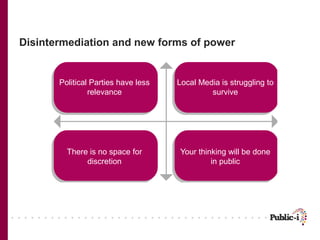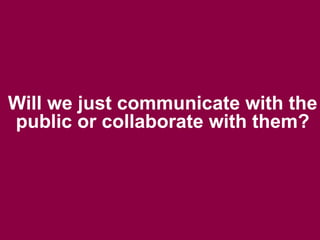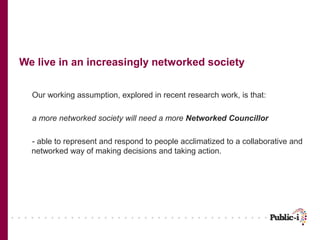Future councillor (nlgn)(february 2013)
- 1. How is the Internet Changing Politics? Catherine Howe, Public-i
- 2. Democratic participation is dropping. Participation online is growing.
- 3. Are these effects related? If so, how are the related? If not, how can we connect them?
- 4. What has the Internet ever done for us?
- 5. Technology or Social Change? The Internet is the most significant technological development of the last 100 years. At least. Self Publication: Disintermediation of the Media Virtual Community and Social Networking: Wide scale use of Networked Power Collaborative Culture: Creating a sharing economy Radical Openness: Disruption of the democratic relationship Networked Technology: Smart Cities and new streams of information Customisation, Making and Self-Service: Disruption of manufacturing and the industrial economy
- 7. Participatory Culture Jenkins, Rheingold With relatively low barriers to artistic expression and civic engagement With strong support for creating and sharing one’s creations with others With some type of informal mentorship whereby what is known by the most experienced is passed along to novices Where Members believe that their contributions matter Where Members feel some degree of social connection with one another (at the least they care what other people think about what they have created)
- 8. We Will Gather http://www.wewillgather.co.uk Grew out of a spontaneous response to the riots in 2011 and #RiotCleanup Based around the simple premise of helping people organise for specific community tasks It worked once – can you work again?
- 9. Networked Power Networked power operates differently to hierarchical power It depends on connections and sharing rather than on roles or structures It is highly responsive to need and opportunity When online it can be highly agile as the environment is designed to support this There are different forms of ties within networks – strong and weak – and these operate differently You need to understand your own contribution to understand your relevance and potential influence
- 10. Occupy http://occupylondon.org.uk No-one is in charge Decisions are negotiated Objectives are contested They are highly networked and agile Is this intelligence or community policing?
- 11. Co-production Co-production means involving all stakeholders in not only designing but delivering outcomes Community engagement theory and practice has moved away from top down models, and best practice examines how you can pass power to communities It takes an asset based approach to communities rather than the traditional deficit model It is a strong ‘fit’ with the participatory culture of the online world It is an important tool in a time when we have to find ‘more for less’
- 12. Community Payback http://www.swmprobation.gov.uk/?page_id=31 A scheme to enable local communities to nominate projects for Community Payback The scheme will be organised online and results will be shared there The project owner presented at CityCamp Coventry and is thinking of this as a social enterprise from the start
- 13. Social Innovation The Social Innovation movement brings many of these ideas together Social Innovation is a term referring to groups, organisations and individuals who use this new environment to create new ways of doing things Usually these projects are civic and ‘pro-social’ They work in highly networked and agile ways and can be both highly effective and highly fragile At their heart is the concept of an unconference – an unscripted gathering of like minded people
- 14. BlueLightCamp http://bluelightcamp.wordpress.com A Social Innovation event based on an unconference format: No agenda, only 1 or 2 formal speakers Hundreds of professionals attending and sharing information Self-directed learning and best practice A way to find early adopters in your organisations
- 15. Is Politics about more than just the media?
- 16. We limit ourselves by simply considering changes to the way we communicate
- 17. There are new rules of engagement Networked Digital Open Agile
- 18. How does this change the relationship between citizen and state?
- 19. Disintermediation and new forms of power Political Parties have less Local Media is struggling to relevance survive There is no space for Your thinking will be done discretion in public
- 20. Will we just communicate with the public or collaborate with them?
- 21. We live in an increasingly networked society Our working assumption, explored in recent research work, is that: a more networked society will need a more Networked Councillor - able to represent and respond to people acclimatized to a collaborative and networked way of making decisions and taking action.
- 22. The qualities of the Networked Councillor Open by default: this is open not just in terms of information but also in terms of thinking and decision making Digitally native: not in terms of age but in terms of the individual adopting the behaviours and social norms of the digital culture Co-productive: an expectation that everyone in the conversation has power to act and the potential to be active in the outcome as well as the decision-making process And as the name says, networked: able to be effective via networked as well as hierarchical power as a leader
- 23. We need to support our Elected Representatives in a way which makes them effective in this Networked and Digital World
- 24. We do not need to show them how to use Twitter
- 25. What do you think?
- 26. Thank you for your time Catherine Howe catherine.howe@public-i.info
Editor's Notes
- 7th November 2012

























